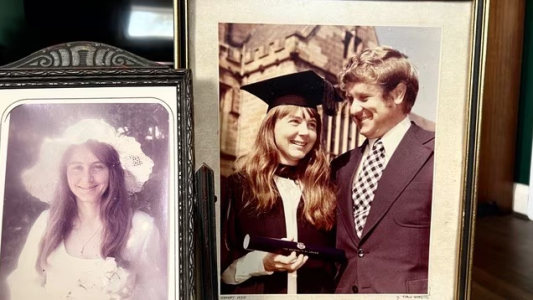Lawyers urge Australians to ensure valid will in place as house prices rise
By
ABC News
- Replies 11
A will can offer peace of mind for families before the death of a loved one, but the process can also go horribly wrong.
It's been a rough few years for the Brigden family in Sydney.
Tim Brigden's mother and father died within six months of each other, without leaving behind an up-to-date, legally binding will.
"It certainly would have helped to have known if there was [any kind of] document and where it was," Mr Brigden told The Business.
"There are no siblings fighting me on this," he said.
"Nobody's staking a claim here.
"Except the NSW Public Trustee and Guardian, who swept in and said, 'Oh, we have to be the executors of your mother's estate.'"
An executor of a will carries out the terms of the will.
The public trustee will step in as executor of an estate if necessary, such as where there is no legally valid will.
Lawyers like Simone Hargreaves pick up the pieces when estate planning and inheritance comes unstuck.
And, Ms Hargreaves says, she's never been so busy.
"The rate of people passing intestate — that is, without a will in place — is growing," she said.
"The data used to be around 48 per cent [of people dying without a will.
"It looks like it's definitely heading north of that and sitting around 60 per cent."
This is according to data from the NSW Supreme Court.
In 2024, for example, 465 contentious probate matters were filed with the NSW Supreme Court and 996 Family Provision claims filed with the NSW Supreme Court.
That makes 1,461 contested estates filed with the court in 2024 alone.
In the same period, a total of 29,936 uncontested probate matters were filed with the Supreme Court.
So far this year, 282 contentious probate matters have been filed, and 541 Family Provision claims have been filed with the NSW Supreme Court — totalling 823 filed contested estates."
In the past, legal costs associated with contesting a will, in most cases, outweighed the benefits.
Ms Hargreaves said that was not necessarily the case anymore.
"When you take into account average house prices around Australia — really not just on the east coast anymore, it's everywhere and you compare that to legal costs," she said.
"[Those legal costs] really haven't gone up anywhere near the rate the average estate has gone up.
"You add house pricing to life insurance, superannuation, and people are doing that cost benefit analysis."
A direction in a will regarding superannuation benefits will likely be ineffective unless the deceased had valid nominations in place with their provider.
Estate planning lawyer Rowdy Johnson said having a legally binding will ensured certainty, including for loved ones left behind.
"Having a valid will in place is that real sense of clarity and control and peace of mind that your assets will pass the way you intend," Ms Johnson said.
She said wills must keep up to date with changes to state-based laws.
"In Victoria, in particular, there's changes to land tax laws that have made people reconsider how they own their assets," Ms Johnson said.
"But also the proposed laws around how much you can have in super and the various taxation differences for that.
"That's definitely made people more aware of the wealth that they have and seeking advice on how to protect that or how to make sure that it passes the way they want it to."
But lawyers say it's the online — Do It Yourself or DIY — will that's causing the most problems for families.
There is legislation in each of the states and territories where a will can be challenged — perhaps because the family member did not, in fact, own the asset they're seeking to pass on in their name.
"That can become really, really difficult with second relationships and blended families because the lines of who is entitled become a lot more murky," Ms Johnson said.
"The trustee and guardian are still involved, and you have to make applications … to the courts through the public trustee."
"So one way or another they were involved, and then it became a case of us having to convince them that it was basically in my best interest, or in the best interest of the estate to have me be the executor.
"And that's where we're still at as convincing them so."
Mr Bridgen said it had taken a significant emotional toll on himself and his family.
"Yeah, it's been a difficult journey."
By business correspondent David Taylor
It's been a rough few years for the Brigden family in Sydney.
Tim Brigden's mother and father died within six months of each other, without leaving behind an up-to-date, legally binding will.
"It certainly would have helped to have known if there was [any kind of] document and where it was," Mr Brigden told The Business.
Public trustee as default executor
As an only child, he assumed he would be the beneficiary of his parents' estate."There are no siblings fighting me on this," he said.
"Nobody's staking a claim here.
"Except the NSW Public Trustee and Guardian, who swept in and said, 'Oh, we have to be the executors of your mother's estate.'"
An executor of a will carries out the terms of the will.
The public trustee will step in as executor of an estate if necessary, such as where there is no legally valid will.
When wills go wrong
Those who seek to be beneficiaries of a will may need legal assistance.Lawyers like Simone Hargreaves pick up the pieces when estate planning and inheritance comes unstuck.
And, Ms Hargreaves says, she's never been so busy.
"The rate of people passing intestate — that is, without a will in place — is growing," she said.
"It looks like it's definitely heading north of that and sitting around 60 per cent."
This is according to data from the NSW Supreme Court.
In 2024, for example, 465 contentious probate matters were filed with the NSW Supreme Court and 996 Family Provision claims filed with the NSW Supreme Court.
That makes 1,461 contested estates filed with the court in 2024 alone.
In the same period, a total of 29,936 uncontested probate matters were filed with the Supreme Court.
So far this year, 282 contentious probate matters have been filed, and 541 Family Provision claims have been filed with the NSW Supreme Court — totalling 823 filed contested estates."
More wealthy estates
And there is a lot of money tied up in these estates — compelling people to bring in lawyers.In the past, legal costs associated with contesting a will, in most cases, outweighed the benefits.
Ms Hargreaves said that was not necessarily the case anymore.
"When you take into account average house prices around Australia — really not just on the east coast anymore, it's everywhere and you compare that to legal costs," she said.
"[Those legal costs] really haven't gone up anywhere near the rate the average estate has gone up.
"You add house pricing to life insurance, superannuation, and people are doing that cost benefit analysis."
Making a valid will
A legally binding will must be signed in front of two independent witnesses.A direction in a will regarding superannuation benefits will likely be ineffective unless the deceased had valid nominations in place with their provider.
Estate planning lawyer Rowdy Johnson said having a legally binding will ensured certainty, including for loved ones left behind.
"Having a valid will in place is that real sense of clarity and control and peace of mind that your assets will pass the way you intend," Ms Johnson said.
She said wills must keep up to date with changes to state-based laws.
"In Victoria, in particular, there's changes to land tax laws that have made people reconsider how they own their assets," Ms Johnson said.
"That's definitely made people more aware of the wealth that they have and seeking advice on how to protect that or how to make sure that it passes the way they want it to."
But lawyers say it's the online — Do It Yourself or DIY — will that's causing the most problems for families.
There is legislation in each of the states and territories where a will can be challenged — perhaps because the family member did not, in fact, own the asset they're seeking to pass on in their name.
"That can become really, really difficult with second relationships and blended families because the lines of who is entitled become a lot more murky," Ms Johnson said.
Emotional toll on family
Meanwhile the costs continue mounting for Tim Brigden, who's still dealing with the New South Wales Public Trustee almost three years after his mother's death."The trustee and guardian are still involved, and you have to make applications … to the courts through the public trustee."
"So one way or another they were involved, and then it became a case of us having to convince them that it was basically in my best interest, or in the best interest of the estate to have me be the executor.
"And that's where we're still at as convincing them so."
Mr Bridgen said it had taken a significant emotional toll on himself and his family.
"Yeah, it's been a difficult journey."
By business correspondent David Taylor











